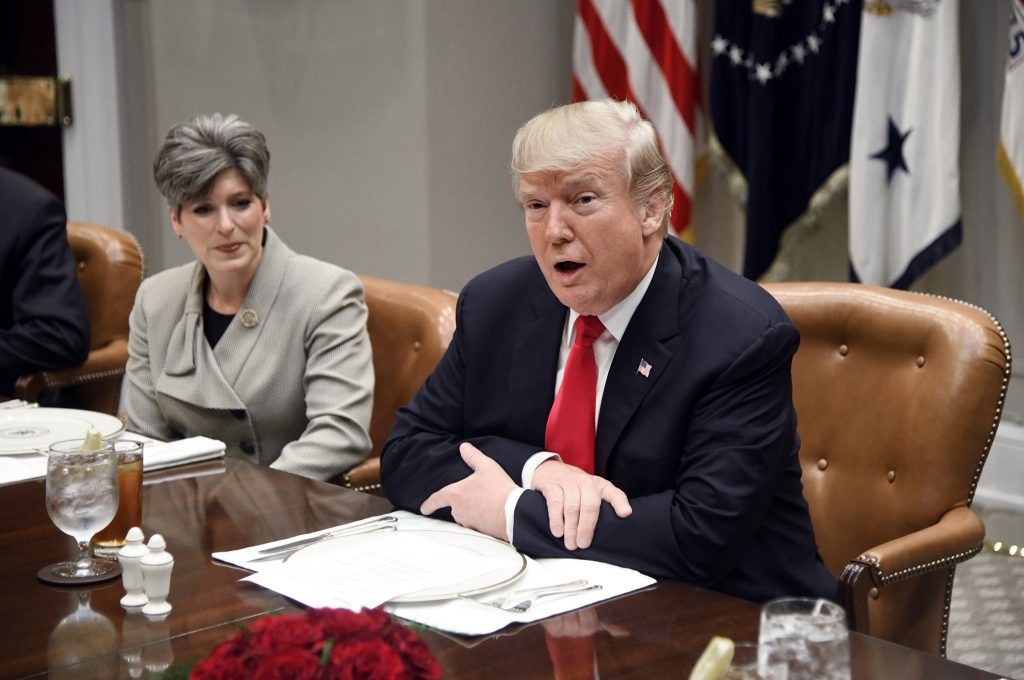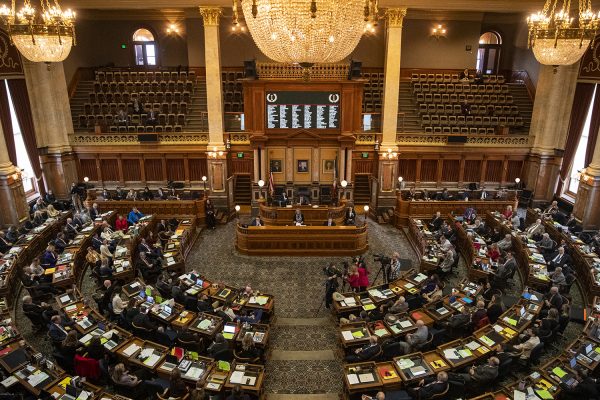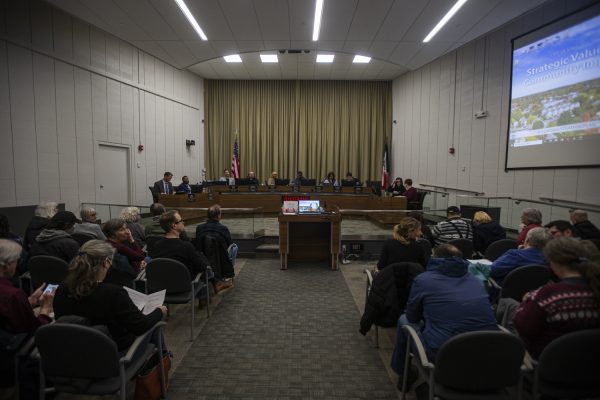Joni Ernst praises trade agreements ahead of U.S. Senate vote on USMCA
Sen. Joni Ernst, R-Iowa, praised the USMCA and the U.S.-China trade agreement in a press call Thursday. She said the deals, brokered with some of Iowa’s biggest trade partners, will be a boost for Iowa farmers and manufacturers.
U.S President Donald Trump speaks as Sen. Joni Ernst from Iowa looks on during a meeting with Republican senators on Tuesday, Dec. 5, 2017 in the Roosevelt Room of the White House in Washington, D.C. (Olivier Douliery/Abaca Press/TNS)
January 16, 2020
Moments before going to the senate floor to ratify a new North American trade deal, Sen. Joni Ernst, R-Iowa, said to reporters in a conference call that she was thrilled by recent developments in international trade among some of Iowa’s biggest trade partners.
In July of 2018, China imposed retaliatory tariffs on U.S. goods — with agricultural goods facing the brunt of the tariffs.
Soybean prices fell more than $2 per bushel since March 2018, Katie James, the public relations manager for the Iowa Soybean Association, said. She said a soybean farmer growing 400 acres of soybeans at 60 bushels per acre would have seen a loss of nearly $50,000.
The Trump administration administered a series of federal aid packages to help assist farmers affected by the trade war. Iowa farmers received between $40 and $79 an acre in July, depending on where they lived.
United States-Mexico-Canada-Agreement
Ernst has long been a proponent of the USMCA, a revision of the North American Free Trade Agreement that President Trump signed in November 2018.
After months of negotiations, the deal gained bipartisan support in both chambers of Congress. The U.S. House of Representatives passed the deal in December, and the Senate approved the pact in a 89-10 vote on Thursday.
Ernst has previously criticized House Democrats for delaying the vote on the USMCA, accusing them of playing partisan politics and ignoring the deal to focus on impeachment.
@SpeakerPelosi and her House colleagues have had more than enough time to pass the #USMCA, yet they’ve failed to do so.
Instead, House Democrats have been fixated on impeaching the President.
— Joni Ernst (@SenJoniErnst) December 4, 2019
In order to achieve bipartisan support, Democrats negotiated changes such as stronger labor standards and environmental protections. The deal was endorsed by the American Federation of Labor and Congress of Industrial Organizations, the largest coalition of labor unions in the U.S.
“Ratifying the USMCA will be a shot of positive energy into the businesses and the communities across rural America. It’s about time we get it done,” Ernst told reporters about an hour before the senate vote.
The agreement is expected to create 176,000 new jobs and boost the GDP by $68.2 billion, according to an April report from the United States International Trade Commission.
Canada and Mexico are by far Iowa’s largest trading partners, accounting for $6.5 billion in exports—nearly 46 percent of total exports in the state—in 2018.
“This agreement will protect Iowa’s pork producers from being caught in the middle, as we were in 2018 and through the first half of 2019,” Trent Thiele, president of the Iowa Pork Producers Association, said in a statement released in December after the House vote. “Economic estimates have said we lost $12 per pig during that time period because of tariff issues.”
Wendong Zhang, an assistant professor of economics at Iowa State University, said the agricultural provisions in the USMCA are not significantly different than they were under NAFTA, but signing it will help stabilize business between the countries.
“Everyone is anxious to get it passed, return to business as usual in some way,” he said.
China-U.S. Trade Agreement
Ernst also commended Trump on reaching a trade deal with China. Ernst, Sen. Chuck Grassley, R-Iowa, and Gov. Kim Reynolds joined the president at the White House Wednesday as he signed phase one of the agreement.
The gang’s all here! As #Iowa’s 4th largest trading partner, China is a critically important market for Iowans, and this phase one deal – which is especially promising for our ag and manufacturing sectors – will help provide certainty for folks back home. pic.twitter.com/BT0Bqx18sm
— Joni Ernst (@SenJoniErnst) January 15, 2020
The deal commits China to purchasing $200 billion in American goods, including $32 billion in agriculture and $77.7 billion in manufactured goods. The agreement keeps in place tariffs on $360 billion in Chinese goods, something that Ernst has criticized in the past.
China is Iowa’s fourth-largest trading partner, accounting for $626 million in exports in 2018. While the agreement aims to bring an end to years of unpredictable trade relations between the two countries, some have raised concerns about China’s ability to hold up its end of the deal, including Grassley.
“I hope this proves to be a turning point in our economic relationship with China, but I’ve seen enough history to be clear-eyed,” Grassley said in a statement on Wednesday. “Not only must China follow through with its commitments in this Phase One deal, but also work toward a comprehensive agreement that ends forced technology transfers, intellectual property theft and unfair restrictions on U.S. goods, including agriculture.”
It’s important to keep pressure on China to hold up the deal, Ernst said on the Thursday conference call, but said she believes the U.S. will see the promised purchases. She noted that dispute resolutions are built into the agreement to settle any conflict that arises.
“I’ll be continuing to work with the administration on ways to ensure China is holding up their end of the deal and to help Iowa farmers and producers succeed,” Ernst told reporters.
Zhang said some of the agricultural community has concerns that the promises in the agreement are unrealistic. He said soybean and corn prices took a small hit on Thursday due to market uncertainty.
“The market currently still doesn’t see a whole lot of concrete details how this potentially could be happening because essentially the next year we’re talking about almost doubling the highest watermark of the agricultural export,” Zhang said.
Still, Zhang said exports to China would be likely the highest in 10-15 years, even if only half the promised exports are made.
In a statement referred to The Daily Iowan by the Iowa Soybean Association, the organization said the agreement was a step in the right direction, but that more action is needed to remedy years of trade uncertainty.
“Reaching this phase-one agreement, however, is just the first step on a long journey to restoring nearly two years of lost sales to the world’s No-1 soybean buyer,” the statement said. “America is now a residual – rather than primary – supplier to a country of 1.4 billion people. The impact of this trade inversion will not be overcome quickly or easily.”
Phase one of the agreement only guarantees the purchases from China for two years. The agreement says the two countries will “project that the trajectory of increases…will continue into calendar years 2022 through 2025.”
Ernst said she’s confident that good trade relations will persist beyond the two-year period of the deal. She said the dispute resolution provisions in the deal allow Iowa farmers to push back if China acts unfairly.
“We know they need those commodities, they can’t force everything from other countries,” Ernst said. “So once we have this reestablished connection with China, I do anticipate that they will continue to be trade partners, but better trade partners to us than what they have been in the past.”















